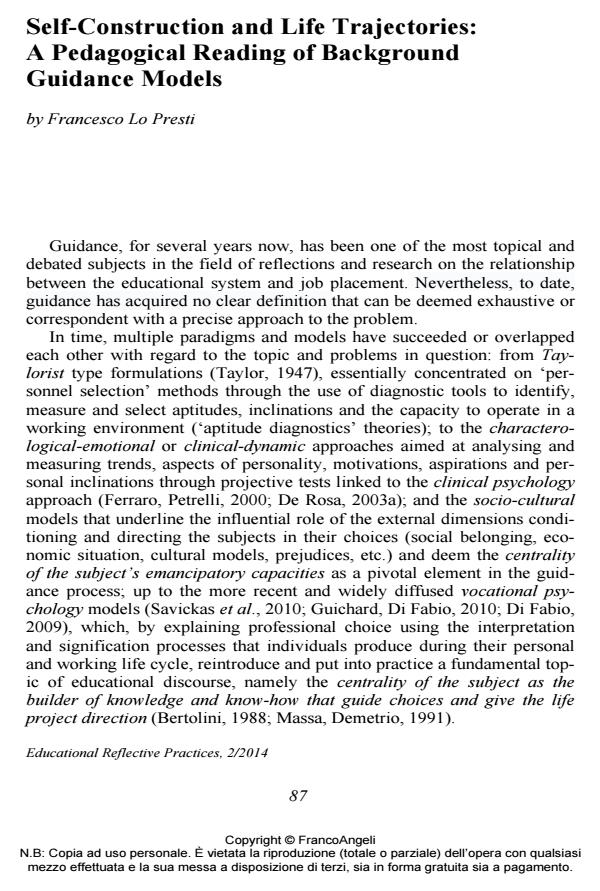Self-Construction and Life Trajectories: A Pedagogical Reading of Background Guidance Models
Titolo Rivista EDUCATIONAL REFLECTIVE PRACTICES
Autori/Curatori Francesco Lo Presti
Anno di pubblicazione 2015 Fascicolo 2014/2 Lingua Inglese
Numero pagine 12 P. 87-98 Dimensione file 110 KB
DOI 10.3280/ERP2014-002006
Il DOI è il codice a barre della proprietà intellettuale: per saperne di più
clicca qui
Qui sotto puoi vedere in anteprima la prima pagina di questo articolo.
Se questo articolo ti interessa, lo puoi acquistare (e scaricare in formato pdf) seguendo le facili indicazioni per acquistare il download credit. Acquista Download Credits per scaricare questo Articolo in formato PDF

FrancoAngeli è membro della Publishers International Linking Association, Inc (PILA)associazione indipendente e non profit per facilitare (attraverso i servizi tecnologici implementati da CrossRef.org) l’accesso degli studiosi ai contenuti digitali nelle pubblicazioni professionali e scientifiche
Starting by complexity, liquidity, fragmentation that, as highlighted in the literature (Sennett, 2008; 2012; Bauman, 2011; 2013), characterize the post-modern condition, underlines the need for the education system to define and propose formative strategies that, by capturing the transition from technical rationality to personal and professional reflexivity, are able to orient individuals in ability to plan the future, being guided by a wider awareness about the prospects, the systems and processes of meaning that compose their life trajectories. Through the pedagogical review of career construction theory (Savickas, 2005) and self-construction theory (Guichard, 2010a; 2010b), actually among the most influential in guidance and both ascribable to the paradigm of Life Designing, the article proposes a reading of guidance processes like processes of reflexive education focused on life trajectories, which try to define possible prospects and borders of this specific aim for research and intervention from an educational point of view
- Alberici, A. (2002). Imparare sempre nella società della conoscenza. Milano: Bruno Mondadori.
- Bauman, Z. (1999). La società dell’incertezza. Bologna: Il Mulino.
- Bauman, Z. (1998). Globalization. The human consequences. Cambridge-Oxford: Polity Press-Blackwell Publishers Ltd.
- Bauman, Z.(2003). Intervista sull’identità. Roma-Bari: Laterza.
- Bauman, Z. (2005). Liquid Life. Cambridge: Polity Press.
- Bauman, Z.(2000). Liquid Modernity. Cambridge-Oxford: Polity Press-Blackwell Publishers Ltd.
- Bertolini, P.(1988). L’esistere pedagogico. Ragioni e limiti di una pedagogia come scienza fenomenologicamente fondata. Firenze: La Nuova Italia.
- Bruner, J.(1990). Acts of Meaning. Harvard: Harvard University Press.
- Bruner, J.(1996). The Culture of Education. Harvard: Harvard University Press.
- Calvani, A. (Ed.) (2007). Fondamenti di didattica. Teoria e prassi dei dispositivi formativi. Roma: Carocci. Cambi, F., Orefice, P. (Eds) (1996). Fondamenti teorici del processo formativo. Contributi per una interpretazione. Napoli: Liguori.
- Cunti, A.(2008). Aiutami a scegliere. Percorsi di orientamento per progettare e progettarsi. Milano:Franco Angeli.
- de Mennato, P. (Ed.) (2006). Progetti di vita come progetti di formazione. Pisa: ETS.
- De Rosa, B. (2003a). Gli stili difensivi e il percorso di scelta. Psicologia Scolastica, 2 (2), pp. 32–47.
- Di Fabio, A. (Ed.) (2009). Career counseling e bilancio di competenze. Firenze: Giunti.
- Ferraro, F., Petrelli, D. (Eds) (2000). Tra desiderio e progetto. Counseling all’università in una prospettiva psicoanalitica. Milano: FrancoAngeli.
- Freire, P. (1968). Pedagogia do oprimido. Rio de Janeiro: Paz e Terra.
- Giddens, A. (1990). The Consequences of Modernity. Cambridge: Polity Press.
- Guichard, J. (2005). Life-Long Self-Construction. International Journal for Educational and Vocational Guidance, 5 (2), pp. 111-124.
- Guichard, J., Di Fabio, A. (2010). Life-designing counseling: specificità e integrazioni della teoria della costruzione di carriera e della teoria della costruzione di sé. Counseling, 3 (3), pp. 277-289.
- Kahneman, D. (2011). Thinking, Fast and Slow. New York: Macmillan.
- Lasch, C. (1984). The Minimal Self. Psychic survival in troubled times. New York: Norton.
- Lave, J., Wenger, E. (1990). Situated Learning: Legitimate Peripheral Participation. Cambridge: Cambridge University Press.
- Lo Presti, F. (2009). Educare alle scelte. L’orientamento formativo per la costruzione di identità critiche. Milano: Carocci.
- Lo Presti, F. (2005). Il senso del sé. Percorsi autoriflessivi nella formazione. Lecce: Pensa Multimedia.
- Lyotard, J.F. (1979). La condition postmoderne: rapport sur le savoir. Paris: Minuit.
- Massa, R., Demetrio, D. (Eds) (1991). Le vite normali. Una ricerca sulle storie di formazione dei giovani. Milano: Edizioni Unicopli.
- Morelli, U. (2006). Conflitto. Identità, interessi, culture. Roma: Meltemi.
- Morin, E., Ciurana, É.R., Domingo Motta, R. (2005). Educare per l’era planetaria. Il pensiero complesso come metodo di apprendimento. Roma: Armando.
- Neisser, U. (1976). Cognition and Reality: principles and implications of Cognitive Psychology. San Francisco: W.H. Freeman & Co.
- Nicolescu, B. (1996). La Transdisciplinarité. Manifeste. Monaco: Éditions du Rocher.
- Savickas M. L.(2005). The Theory and Practice of Career Construction. In Brown S. D. & Lent R. W. (Eds.), Career Development and Counseling: putting theory and research to work, (pp. 42-70). New York : Hoboken, John Wiley & Sons.
- Savickas, M.L., Nota, L., Rossier, J., et al. (2010). Life design: un paradigma per la costruzione della vita professionale nel XXI secolo. GIPO – Giornale Italiano di Psicologia dell’Orientamento, 11 (1), pp. 3-18.
- Schön, D.A. (1987). Educating the Reflective Practitioner: towards a new design for teaching and learning in the profession. San Francisco: Jossey-Bass.
- Sennet, R. (1998). The Corrosion of Character. The personal consequences of work in the new capitalism. New York – London: W.N. Norton & Co.
- Taylor, F.W. (1947). The principles of scientific management. New York: Harper & Row.
- von Glasersfeld, E. (1995). Radical Constructivism: a way of knowing and learning. London-Washington: The Falmer Press.
- Vygotskij, L.V. (1972). Thought and Language. Cambridge (MA): The MIT Press.
- Watzlawick, P., et al. (1984). The Invented reality: how do we know what we believe we know? Contributions to constructivism. New York-London: Norton
Francesco Lo Presti, Self-Construction and Life Trajectories: A Pedagogical Reading of Background Guidance Models in "EDUCATIONAL REFLECTIVE PRACTICES" 2/2014, pp 87-98, DOI: 10.3280/ERP2014-002006